

Gut Health = Mental Health? The Impact of Diet and Dietary Supplements on Mood Disorders. Food and Mood: the Corresponsive Effect. 1.Liu X, Yan Y, Li F, Zhang D.
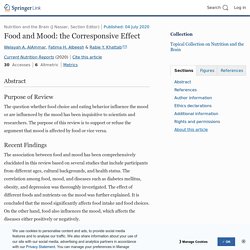
Fruit and vegetable consumption and the risk of depression: a meta-analysis. Nutrition. 2016;32:296–302. Article PubMed Google Scholar 2.Boddy L, Abayomi J, Johnson B, Hackett A, Stratton G. Ten-year changes in positive and negative marker food, fruit, vegetables, and salad intake in 9-10 year olds: SportsLinx 2000-2001 to 2010-2011. J Hum Nutr Diet. 2013;27:236–41.PubMed Google Scholar 3.de la Fuente-Arrillaga C, Zazpe I, Santiago S, Bes-Rastrollo M, Ruiz-Canela M, Gea A, et al.
Probiotic food consumption is associated with lower severity and prevalence of depression: A nationwide cross-sectional study. Antidepressant utilisation and incidence of weight gain during 10 years’ follow-up: population based cohort study. Rafael Gafoor, research associate1, Helen P Booth, senior researcher1 2, Martin C Gulliford, professor of public health1 3Author affiliationsCorrespondence to: R Gafoor Rafael.gafoor@kcl.ac.ukAccepted 13 April 2018 Abstract Objective To evaluate the long term association between antidepressant prescribing and body weight.

Design Population based cohort study. Setting General practices contributing to the UK Clinical Practice Research Datalink, 2004-14. Participants 136 762 men and 157 957 women with three or more records for body mass index (BMI). Main outcome measures The main outcomes were antidepressant prescribing, incidence of ≥5% increase in body weight, and transition to overweight or obesity. Results In the year of study entry, 17 803 (13.0%) men and 35 307 (22.4%) women with a mean age of 51.5 years (SD 16.6 years) were prescribed antidepressants. Conclusion Widespread utilisation of antidepressants may be contributing to long term increased risk of weight gain at population level. Preventing Depression Through Food. The Effects of Dietary Improvement on Symptoms of Depression... : Psychosomatic Medicine. Depressive disorders affect more than 300 million people around the world and are associated with unemployment, poor physical health, impaired social functioning, and, in its most severe forms, suicide (1).
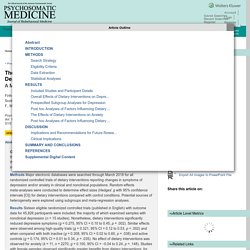
Thus, depressive disorders incur considerable burden not only for individuals but also for society because of the high economic cost from lost productivity and demand on healthcare services (2). The same can be said for anxiety disorders, which, along with depression, are also classified as “common mental disorders” because of their prevalence across the globe, with approximately one in five people experiencing one of these conditions for any given year (3).
Standard treatments for common mental disorders comprise psychopharmacological and psychotherapeutic interventions. Although these have established efficacy in depression, a substantial proportion of people do not achieve remission using such strategies (4). Search Strategy Eligibility Criteria Data Extraction Statistical Analyses. Effect of Integrated Behavioral Weight Loss Treatment and Problem-Solving Therapy on Body Mass Index and Depressive Symptoms Among Patients With Obesity and Depression: The RAINBOW Randomized Clinical Trial. Key Points Question Does an integrated collaborative care intervention improve weight loss and depressive symptoms among patients with obesity and depression?
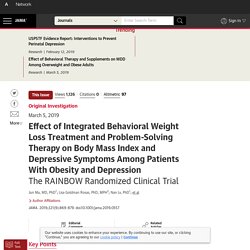
Findings In this randomized clinical trial that included 409 patients with obesity and depression, an intervention that integrated behavioral weight loss treatment and problem-solving therapy with as-needed antidepressant medications resulted in statistically significant reductions in body mass index compared with usual care (−0.7 vs −0.1, respectively) and depressive symptoms (−0.3 vs −0.1 on the 20-item Depression Symptom Checklist; score range, 0-4) at 12 months. Effect of Multinutrient Supplementation and Food-Related Behavioral Activation Therapy on Prevention of Major Depressive Disorder Among Overweight or Obese Adults With Subsyndromal Depressive Symptoms: The MooDFOOD Randomized Clinical Trial. Key Points Question What is the effect of multinutrient supplementation and food-related behavioral activation therapy on prevention of a new episode of major depressive disorder among overweight or obese adults with subsyndromal depressive symptoms?
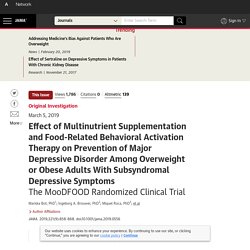
Findings In this 2 × 2 factorial randomized clinical trial that included 1025 adults, there was no significant difference in episodes of major depressive disorder over 1 year of follow-up with multinutrient supplementation vs placebo (54 [10.5%] vs 51 [9.9%]) or with food-related behavioral activation therapy vs no therapy (48 [9.4%]) vs 57 [11.1%]). Meaning These findings do not support the use of multinutrient supplementation or food-related behavioral activation therapy for prevention of major depressive disorder. Importance Effects of nutritional interventions on the prevention of major depressive disorder (MDD) in overweight adults are unknown. Trial registration ClinicalTrials.gov Identifier: NCT02529423. Diet and Depression—From Confirmation to Implementation. The MooDFOOD project: Prevention of depression through nutritional strategies - Cabout - 2017 - Nutrition Bulletin.
Abstract MooDFOOD is a ‘Multi-country cOllaborative project on the rOle of Diet, Food-related behaviour, and Obesity in the prevention of Depression’.
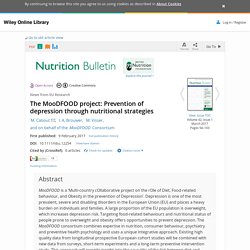
Depression is one of the most prevalent, severe and disabling disorders in the European Union (EU) and places a heavy burden on individuals and families. A large proportion of the EU population is overweight, which increases depression risk. The effects of dietary improvement on symptoms of depression... : Psychosomatic Medicine.